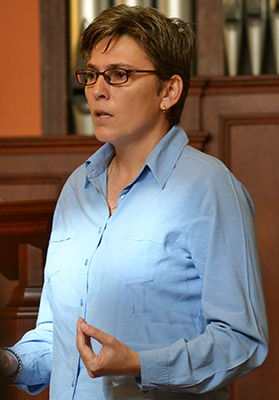Constitutional Court throws out fired lesbian minister’s case

Ecclesia de Lange
The Constitutional Court has refused to rule on fired lesbian minister Ecclesia De Lange’s claim that she was discriminated against by the Methodist Church.
While the dismissal of De Lange’s appeal was largely based on technicalities, it was also a sign of the courts’ continued reticence in issuing a definitive ruling on if religious beliefs can be used to discriminate on the basis of sexual orientation.
De Lange was dismissed by the church in January 2010 after she announced to her Western Cape congregation that she would be marrying her same-sex partner (the couple has since divorced).
At the time, De Lange referred the matter to arbitration within the church. By proceeding with the arbitration De Lange agreed not to pursue legal action.
She later claimed the process was unfair and took the case to the Western Cape High Court and then the Supreme Court of Appeals, both of which referred her back to arbitration.
On Tuesday, the Constitutional Court, which admitted that the case raised “numerous difficult questions,” agreed with the lower courts and said that De Lange had to resolve the issues through arbitration.
The court also stated that because the matter relates to interpretation of religious doctrine, arbitration would be the best way to examine the church’s application of its rule against same-sex marriages for ministers.
“I am persuaded by the submissions of the Church that arbitration would be the ideal forum for Ms De Lange and the Church to see where the balance between dogma and tolerance should be struck,” wrote Deputy Chief Justice Dikgang Moseneke in the unanimous decision.
He added that, “It would not be appropriate for this Court to interfere at this stage especially considering that the line is close to the Church’s doctrines and values.”
The court further found that De Lange had not pursued her unfair discrimination claim before the High Court and was thus not able to raise the claim for the first time on appeal.
In addition, the court agreed with the Methodist Church that the former minister should have first taken her unfair discrimination claim to the Equality Court before proceeding to the other courts.
Justice Dikgang Moseneke concluded that if and when the issue of unfair discrimination as found in De Lange’s case is again properly and procedurally brought to the courts in future, “it will require all the judicial, if not Solomonic, wisdom we Judges can muster right through our court system.”
Responding to the decision on Facebook, De Lange wrote that she will “respectfully accept the ruling of the Constitutional Court” but had to admit “that I am extremely disappointed.”
She added: “My legal team and I are studying the ruling and will release a statement at our earliest convenience.”
In statement, De Lange’s attorney, Pieter Van R. Coetzee, commented: “The highest court of the land has spoken and we respect its judgment.
“However, that is not to say that we, as the legal team and above all our client Ecclesia, are not naturally highly disappointed with the outcome as we are of the respectful opinion that there are perhaps core issues that the court could have pronounced on.
“Be it as it may, we are at present studying the complete written judgment since from its very nature it entails various aspects that are to be considered. Nothing more can and will be said at this point in time from the legal team’s side,” added Coetzee.
- Facebook Messenger
- Total134
Hierdie is ernstig. Dit gaan nie oor gay regte nie, dit gaan oor die Grondwetlike Hof se weiering om aan kerke die Grondwet af te dwing. Die kerke is basies dus carte blanche gegee om NIE die Grondwet te gehoorsaam nie en te diskrimineer soos hulle wil. Die grondwetlike regters het geskuil agter tegniese punte om te vermy om teen die kerk uitspraak te gee – die oudste truuk in die boek as regters nie wil ‘n uitspraak gee nie, die Republikeinse Amerikaanse regters het dit in die Obergefel-saak probeer in die VSA, maar Kennedy het hul gekortwiek deur die werklike twispunte aan te spreek and the majority ruled 5 -4. Dis die eerste keer in ons grondwetlike geskiedenis sedert 1994 dat hierdie hof teen LGBTI mense uitspraak lewer, maar dit het impak op alle Suid-Afrikaners.
The Court maybe 100% procedurally correct BUT and here is the big but – churches may also not be allowed to discriminate. There have been rulings on that line before (see the Johan Meyer vs NG Kerk Morelletta case). This was just an easy way out for the judges – it is the Con Court – they do not HAVE to follow a procedure if the procedure is unfair.